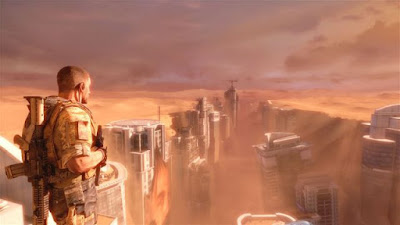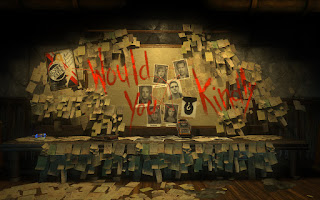Looking Back at the Mass Effect trilogy - Part Two
Mass Effect 2 (2010)
To
be honest, throughout my replay of the first Mass Effect I was mostly just
excited to move onto the sequel. In my memory ME2 was always the standout in
the trilogy and its rare metacritic score of 96 certainly supports this. But
after the first game’s poor aging I was slightly worried about how ME2 would
fare 8 years later.
Immediately the improvements made to ME2’s combat are most evident. ME2
feels much more like a third-person shooter then the original did. Even though
initial criticisms stemmed from the game dumbing down the more RPG elements of
its predecessor, in hindsight it wasn’t ‘dumbing down’ as much as it was just
trimming the fat. Guns have more of a kick to them, and aren’t as clumsy to use
as they use to be. Movement has also been streamlined to feel more responsive
and moving into cover is as snappy as it should be.
What’s perhaps most impressive about ME2’s gameplay enhancements isn’t
just that it feels better, but that it finds an identity. The first Mass
Effect’s combat was plain and lackluster, but ME2 remedies this largely thanks
to its satisfying abilities. Turning enemies into ice just to smash them,
lifting them off of the ground to get a better shot and overloading their
shields are just a few examples of ME2’s abilities giving you the thrill of
embodying a sci-fi super soldier. Cover based shooting is still prominent but
not necessary in every situation, almost becoming the ‘Bioshock’ equivalent of
third-person shooters. The combat as whole is just an excellently paced
joyride. Plus, the removal of the terrible MAKO doesn’t hurt.
ME2’s
progression system is also less of a headache; instead of being loot-based with
Shephard coming across a new weapon every few steps, instead you simply have
the ability to buy upgrades to your weapons and armor which is also
customisable this time around.
The
sequel finds its footing in its art style too. Moody neon lights drench
nightclubs; deep reds saturate other scenes with an ominous mist or abnormally
large alien sun. Whether it’s the richer colouring\lighting, or more detail
when it comes to textures and material, ME2 is just an infinitely more
interesting game to look at then its predecessor. Just glancing at the two
games side by side makes it clear that ME2 is much denser with detail, from
posters, signs, plants or even a picture of Liara (who I previously romanced in
the last game) in Shepard’s room. Despite it’s heavy use of neon lights and
moody environments in certain sections, ME2 dodges feeling like another
‘Balderunner’ clone, aesthetically. There’s enough of a light tone in most of
ME2’s hub areas and the world never feels overly industrial or apocalyptic like
many other futuristic games. It’s certainly helped by the fact that all of the
architecture, ships, weapons, aliens etc. have a distinctly Mass Effect look to
them, nothing looks like it can exist in a ‘Halo’ game, or a ‘Star Wars’ movie.
A strong sense of self is just another major improvement from the original.
The
sequel somehow also manages to outdo the originals immaculate story with an
innumerable amount of great character moments and a larger sense of desperation
with the looming threat of the Reapers. ME2 comes out swinging straight away
with Commander Shepard actually dying. Talk about setting the tone. A hulking,
mysterious alien ship blows up Shepard’s ship, the Normandy, in one of the
coolest moments of the trilogy. Shepard desperately goes through a half-wrecked
space ship with debris floating all over the place and a beautiful backdrop of
a planet visible through a hole in the Normandy’s ceiling. After you’ve made sure
your entire crew’s been safely evacuated the Normandy blows up with Shepard in
it, sending him flying out into the darkness of space. The game quite literally
starts with a bang.
Shepard’s death doesn’t last long however, (at least not in the real-world)
as the game jumps forward 2 years to a human interest group, Cerburus, spending
billions to revive Shepard. You slowly learn about the new state of the
universe; the Council is convinced the Reaper dreadnought from the first time
is an isolated case and the threat has been eradicated, and the Reapers
themselves have graduated from an alliance with the geth, to an alliance with
an enigmatic race, the Collectors. Despite knowing Cerburus’ shady, often
illegal and immoral past, Shephard has no choice but to accept their leader’s
(the Illusive Man’s) help and financing since the Citadel Council is seemingly
a fan of the phrase ‘ignorance is bliss’. It’s up to Shephard to essentially
form a suicide squad to find the Collector base and stop whatever they’re
planning with the Reapers. Just like the first game, the plot is nothing
groundbreaking, but so much of ME2’s emotional crescendos, urgency and
world-building are shouldered by its cast, perhaps more than any other game
I’ve ever played.
This time around the cast is quite a bit larger with 10 party members
rather than 6. Only two of your previous squad members return with Garrus and
Tali, while initially being disappointed by the lack of returning squad members
this actually works in the game’s favour. The new cast makes even more of a
profound impression than the originals and allow for more opportunities to mix
character-driven moments with the overarching story. Mordin Solus in particular
steals the show, being a salarian scientist involved in revising the genophage
that led to mass infertility in the krogan there’s a lot of chance to flesh out
this fragile political situation. With my first conversation with Mordin about the
genophage my stance seemed obvious, it’s a terrible disease, we learnt this in
the first game from Wrex, it’s almost a death sentence to his people. After
pointing this out to Mordin his response shocked me after it added a layer of
grey morality to the genophage. He felt that he did what was needed to prevent
another krogan rebellion if they regain the numbers, while also avoiding the
extinction of the krogan. Mordin’s dead-set on his reasons at this point and
everything else about his character comes together spectacularly. His monotone
voice and fast, no-nonsense speech adds comedy to his character. I enjoyed
talking to him so much between missions he actually pulled Shephard aside to
tell him that he wasn’t interested in a romantic relationship and that it was
nothing personal, a hilarious moment. It only makes his upcoming ethical crisis
and contemplation of his role in the genophage more effecting.
Jack, a violent, often unhinged ex-convict that Shepard busts out of
jail is another highlight for me. Having thought that the originals romance
options were limited, I wasn’t expecting this particular romance choice to be
so layered and emotional. Learning about how Jack got into jail by leaving a
crater on a moon and other sometimes hilarious misadventures makes her
endearing enough, but her backstory of being brutally tested on by Cerburus as
a child and her tragic violent life after is borderline heart-wrenching. While
most romance storylines culminate in a sex scene, this one ends with Jack
crying in Shepard’s arms right before the suicide mission, with the implication
that Shepard’s helped her work through her past trauma. Breaking through to a
character and having them unravel is another reason Mass Effect’s dialogue and relationships
are so mesmorising, and it’s in full effect with Jack’s romance storyline.
The
rest of the cast are similarly endearing and interesting. The addition of a
geth squad member adds some much needed context for the previously hostile
race, while also adding inevitable drama between it and Tali. But some of ME2’s
best missions actually revolve around a single character. Once a strong
relationship is built with one of your squad members they’ll ask you for a
favour leading to a character specific side mission, loyalty missions. After
learning about every character’s history, helping them deal with past demons is
immensely satisfying and gives every character their own arc in a way they
might not have had otherwise with the grander proceedings of the main plot.
Just like the beginning of the game, the end closes with a bang too.
After an entire game’s worth of setup the game’s final mission, the suicide
mission, doesn’t disappoint. Your knowledge of every squad member is put to the
test as you assign each character to a role based off of their abilities to
infiltrate the Collector base. Make a wrong choice and that character will die
permanently and won’t show up for ME3. The stakes are high and the execution is
devilishly dramatic. The game’s final shot just the cherry on top with a fleet of
Reapers looming over the Milkyway with the galaxy painfully underprepared.










Comments
Post a Comment